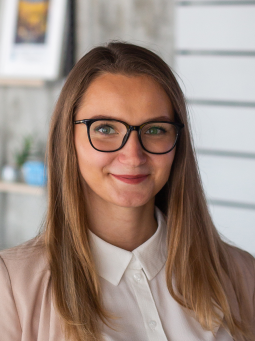What's
Highlights from the training school on Representation Mediated Multimodality
Ivana Beňová is one of our PhD students. She is a member of the Natural Language Processing team where she focuses on multimodal processing with images and text. At the end of the September, Ivana attended the Training school funded by EU COST Action Multi3Generation. Read on to find out more about her experience.
My trip started on Monday, 26th of September with a flight to Bremen and later a train ride to a small village near Bremen, called Etelsen. The training school was held in Schloss Etelsen and its main topic was “Representation Mediated Multimodality”.
The first day of school was reserved not only for arrival, but also for introduction. Since there were only 18 participants of the training school and 10 speakers from all around Europe, we introduced ourselves and got to know each other quickly.
The main program started on Tuesday, with lightning presentations of the participating PhD students about their research. It was really fascinating for me to see how many different points of view there can be on multimodality. We were a very diverse group of researchers interested in very different areas of research such as psychology, cognitive science, responsible AI, image-language processing, video processing or robotics.
After the students’ lightning presentations, there was also a quick introduction of the speakers, most of them professors from prestigious European universities or research institutes. Just like the students, they were also a very diverse group in regard to their research interests.
After all of the introductions, the three and a half days of in-depth presentations by each of the speakers started. Every presentation was an hour and a half long, striking and information-packed.
The topics of the talks were as follows:
- overview of multimodal learning with vision and language (Prof. Erkut Erdem),
- visual grounding (Prof. Raffaella Bernardi, Prof. Albert Gatt),
- visuospatial commonsense (Prof. Mehul Bhatt, Dr. Jakob Suchan),
- multimodal commonsense reasoning (Prof. Aykut Erdem),
- detecting relationships in images (Prof. Adrian Muscat),
- responsible AI (Prof. Helena Gorete Silva Moniz), and
- robotics (Prof. Karinne Ramirez-Amaro).
After every presentation, a short Q&A session was held. All presentations were separated by a coffee break or lunch, so we always had time to discuss each presentation with its speaker in more detail.
At the end of the training school the roles of professors and students were exchanged, and for a few minutes each of us had time to talk about his or her research in more detail. We obtained important and valuable feedback or suggestions about how to improve our work. Afterwards we presented in groups what we had learned during the training school, what we liked and what could be improved for the next year’s participants.
Although all presentations and research-related talks were thought-provoking, the exchange of knowledge wasn’t the only purpose of the training school. The main goal was for young researchers to create an international research network of experts and PhD students, with whom they can cooperate with in the future. I found many friends among participants, we exchanged contacts and I hope we will stay in touch. However, I also found a good connection with the professors and I plan on taking advantage of such acquaintances in my future research. I am part of the Multi3Generation working group now, so I can participate in collaborative writing of papers. I can also contact the professors for cooperation with KInIT in case of interesting projects that will cover their interests or go for a scientific mission and work on the research related to my PhD with a professor abroad.
I am thrilled that I was able to participate in such an event. I gained a lot of new knowledge about different areas of research connected to AI. I am definitely looking at multimodality as a more complex but also even more impressive problem now. However, what I am even more overjoyed about, is the fact that the participation in this training school opened a lot of doors for me to international research with top experts in multimodal processing.
I really liked the approach of the organizers and the way all of the speakers found the time to get to know the PhD students better, discuss their research or answer their questions. It was an amazing experience for me and I can only recommend attending this or some other training school to all PhD students.
You can find out even more about this training school here.


